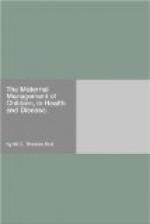OF THE STOOLS.
In the new-born infant the motions are dark coloured, very much like pitch both in consistence and appearance. The first milk, however, secreted in the mother’s breast, acts as an aperient upon the infant’s bowels, and thus in about four-and-twenty hours it is cleansed away; or if it should not, a tea-spoonful of castor oil accomplishes this purpose.
From this time, and through the whole of infancy, the stools will be of a lightish yellow colour, the consistence of thin mustard, having little smell, smooth in appearance, and therefore free from lumps or white curded matter, and passed without pain or any considerable quantity of wind. And as long as the child is in health, it will have daily two or three, or even four, of these evacuations. But as it grows older, they will not be quite so frequent; they will become darker in colour, and more solid, though not so much so as in the adult.
Any deviation, then, from the above characters, is of course a sign of something wrong; and as a deranged condition of the bowels is frequently the first indication we have of coming disease, the nurse should daily be directed to watch the evacuations. Their appearance, colour, and the manner in which discharged, are the points principally to be looked to. If the stools have a very curdy appearance, or are too liquid, or green, or dark-coloured, or smell badly, they are unnatural. And in reference to the manner in which they are discharged, it should be borne in mind, that, in a healthy child, the motion is passed with but little wind, and as if squeezed out, but in disease, it will be thrown out with considerable force, which is a sign of great irritation. The number, too, of stools passed within the four-and-twenty hours it is important to note, so that if the child does not have its accustomed relief, (and it must not be forgotten that children, although in perfect health, differ as to the precise number,) a little castor oil may be at once exhibited, and thus mischief be prevented.
This, however, is not the place to discuss the question of disordered bowels, but simply to point out how this circumstance may be known.[FN#27]
[FN#27] See section on Disorders of the Stomach and Bowels, p. 208.
OF THE BREATHING AND COUGH.
The breathing of a child in health is formed of equal inspirations and expirations, and it breathes quietly, regularly, inaudibly, and without effort. But let inflammation of the air-tubes or lungs take place, and the inspiration will become in a few hours so quickened and hurried, and perhaps audible, that the attention has only to be directed to the circumstance to be at once perceived.
Now all changes which occur in the breathing from its healthy standard, however slight the shades of difference may be, it is most important should be noticed early. For many of the complaints in the chest, although very formidable in their character, if only seen early by the medical man, may be arrested in their progress; but otherwise, may be beyond the control of art. A parent, therefore, should make herself familiar with the breathing of her child in health, and she will readily mark any change which may arise.




